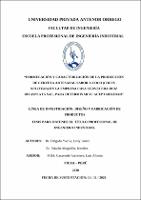Formulación y caracterización de la producción de cerveza artesanal sabor a coco (Cocus nucifera) en la empresa Casa Cervecera Ruiz Rivasplata SAC, para determinar su aceptabilidad

View/Open
Download
(application/pdf: 2.636Mb)
(application/pdf: 2.636Mb)
Date
2020Author(s)
Delgado Yacila, Lesly Janeth
Pulache Mogollón, Jennifer
Metadata
Show full item recordAbstract
La presente investigación tuvo como objetivo principal formular y caracterizar la producción
de cerveza artesanal sabor a coco (Cocus Nucifera) en la empresa CASA CERVECERA
RUIZ RIVASPLATA SAC, para determinar su aceptabilidad.
En primer lugar, se definió el estilo de cerveza artesanal a formular y las especificaciones
del producto, se hizo un diagnóstico (análisis fisicoquímico) del agua para determinar si
cumple o no con los parámetros establecidos, posteriormente se planteó y se describió el tipo
de materia prima, insumos, materiales, equipos y tecnología que formarían parte del proceso
productivo en la fabricación de cerveza artesanal sabor a coco. Luego se realizaron pruebas
(organolépticas, densidad, grado brix y pH) a la fruta característica a utilizar, el coco para
determinar si era factible emplear: El agua de coco, el agua de coco más la pulpa o la pulpa
de coco para a producción de cerveza. Finalmente se hicieron 5 formulaciones para elaborar
un prototipo de cerveza artesanal, teniendo en cuenta la cantidad de materia prima, insumos,
y demás factores que intervienen en el proceso (tiempo, temperatura, densidad, pH, grado
brix) con el fin de cumplir con los parámetros establecidos según el estilo de cerveza
artesanal (Belgian Blonde Ale) y sobre todo se tuvo en cuenta en qué tiempo y etapa del
proceso productivo era idóneo agregar el coco con el fin de obtener el prototipo de cerveza
objetivo.
Después de haber realizado la experimentación y la selección del prototipo más aceptable,
muestra N°4, pudimos obtener el diagrama de flujo con el proceso productivo más idóneo
para la elaboración de la cerveza artesanal a base de coco (teniendo en cuenta las etapas,
tiempos, materia prima, equipos, instrumentos). Según el prototipo más aceptable,
concluimos que la pulpa de fruta (coco) se adiciona en la etapa del macerado del proceso
productivo, logrando obtener un mejor sabor y aroma de la cerveza. The main goal of the present investigation was to formulate and characterize coconut
flavored craft beer (Cocus Nucifera) production in the company CASA CERVECERA RUIZ
RIVASPLATA SAC, in order to determine its acceptability.
In the first place, the style of craft beer to be formulated and the specifications of the product
were defined, a diagnosis (physicochemical analysis) of the water was made to determine
whether or not it meets the established parameters, then the type of matter was raised and
described raw material, supplies, materials, equipment, and technology that would be part of
the production process in the manufacture of coconut-flavored craft beer. Then tests
(organoleptic, density, Brix degree, and pH) were carried out on the characteristic fruit to be
used, the coconut, to determine if it was feasible to use: Coconut water, coconut water plus
coconut pulp, or just pulp, for production of beer. Finally, 5 formulations were made to make
a prototype of craft beer, taking into account the amount of raw material, inputs, and other
factors involved in the process (time, temperature, density, pH, Brix degree) in order to
comply with the parameters established according to the craft beer style (Belgian Blonde
Ale) and above all it was taken into account at what time and stage of the production process
it was ideal to add the coconut in order to obtain the target beer prototype.
After having carried out the experimentation and selection of the most acceptable prototype,
sample N ° 4, we were able to obtain the flow diagram with the most suitable production
process for the production of coconut-based craft beer (taking into account the stages, times,
raw material, equipment, instruments). According to the most acceptable prototype, we
conclude that the fruit pulp (coconut) is added in the maceration stage of the production
process, achieving a better taste and aroma of the beer.
Collections
- Ingeniería Industrial [399]

